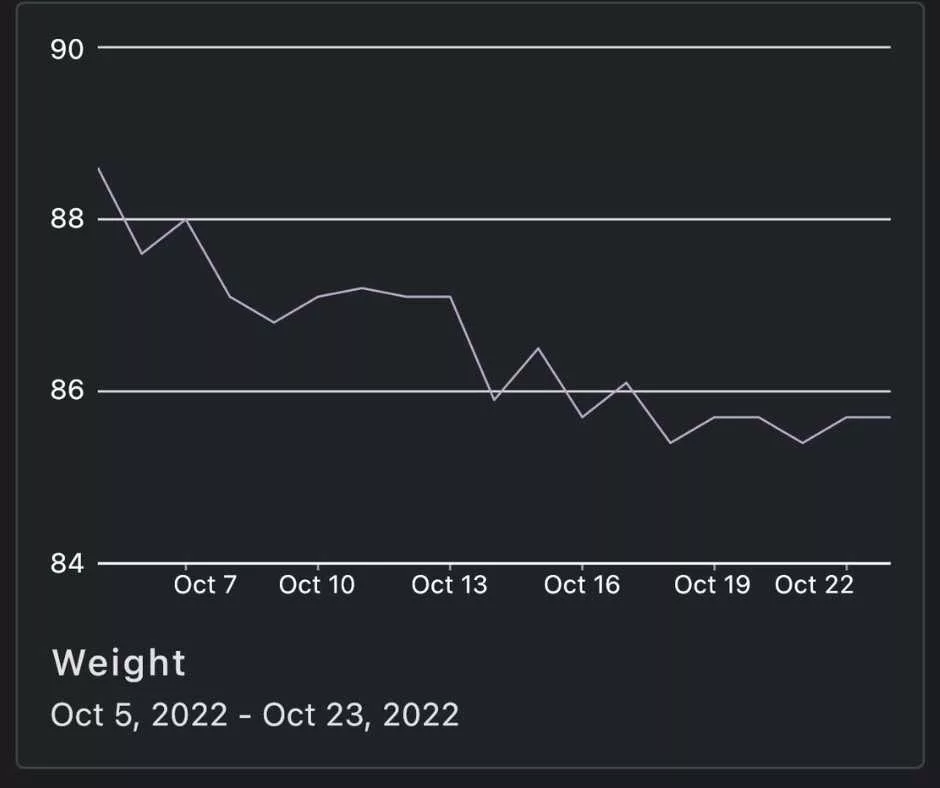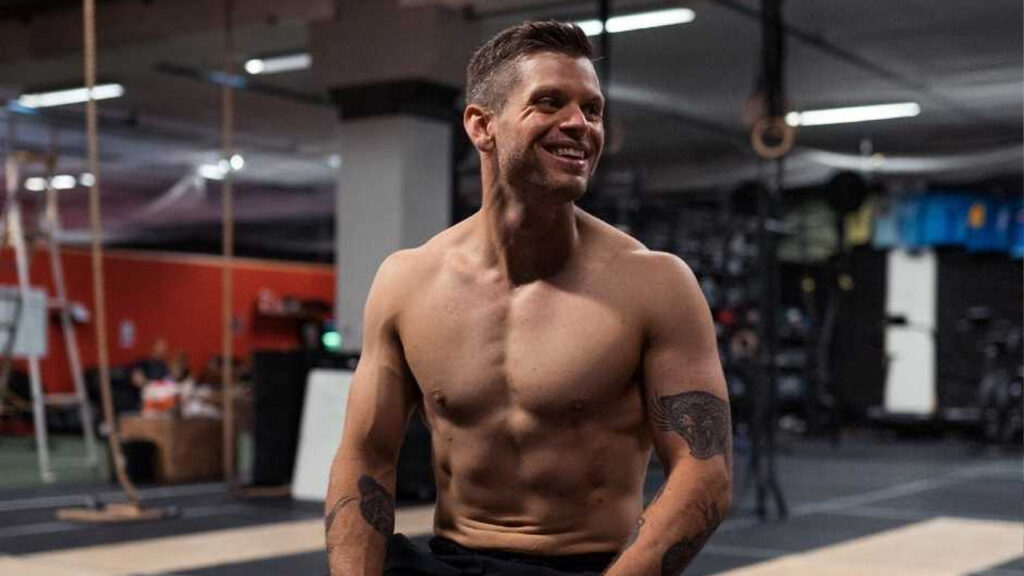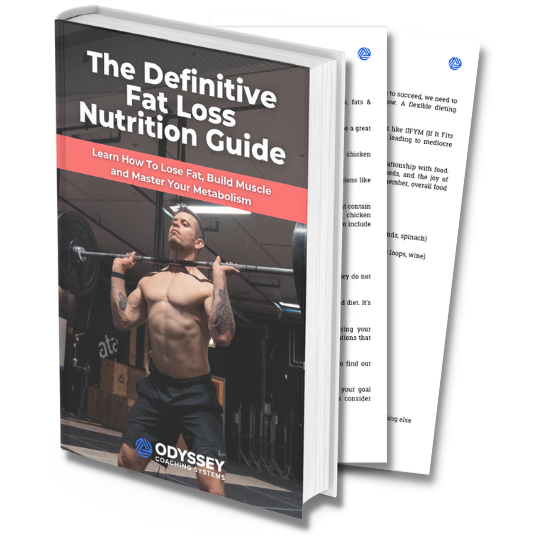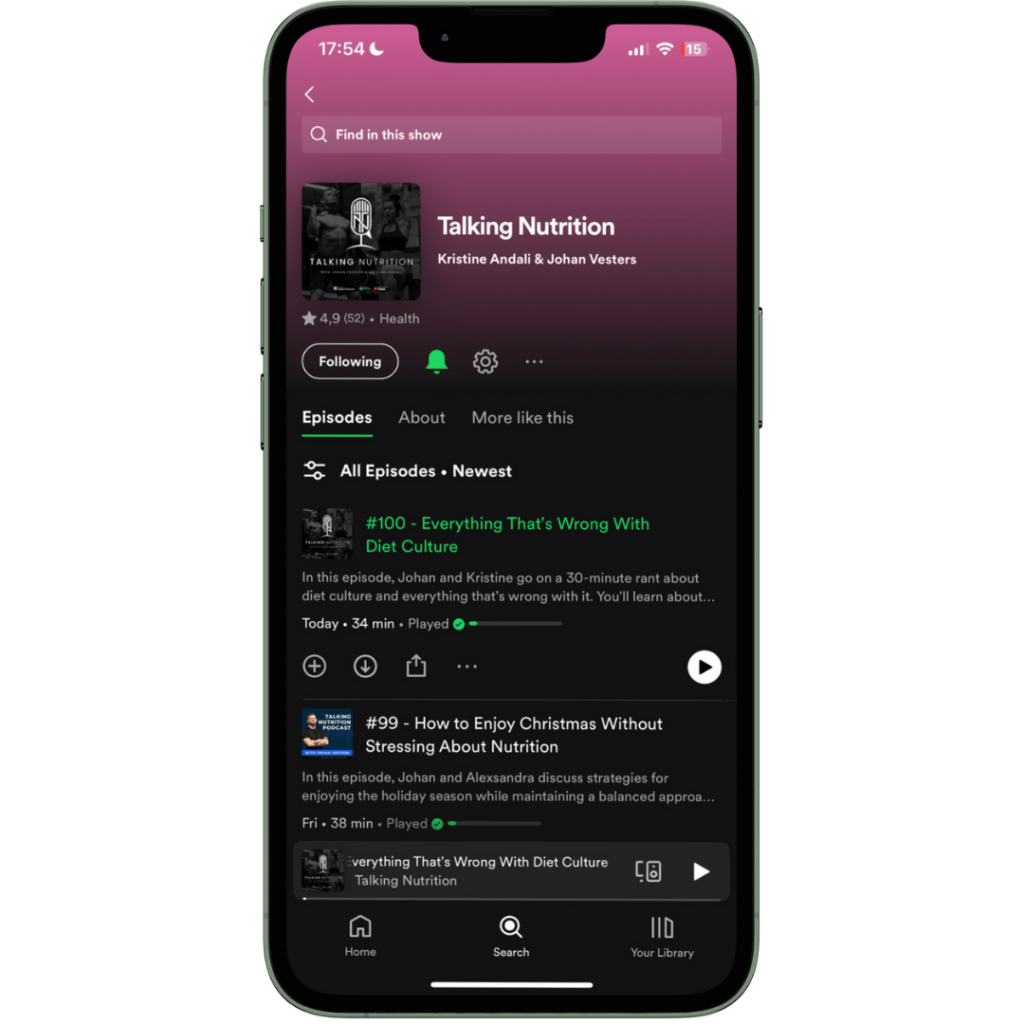Main Take-Aways
1. There’s a chance you did not hit a true weight loss plateau. Being on lower calories does not have to mean that you’re in a calorie deficit. If you are in a deficit and you’re not seeing any of your metrics improve for weeks, even though you’ve been consistent… then you are not in a calorie deficit.
2. No weight loss doesn’t mean no fat loss. Just going off body weight is not enough to judge whether you are losing fat or not.
3. No adjustments will make up for inconsistencies.
Ever wonder why you’re not losing weight in a calorie deficit? It’s frustrating to not see the scale go down even though you’re doing everything, right?
Here’s something you might not know..
It’s completely normal for things to slow down, and to sometimes not see any changes on the scale for weeks on end.
But you might still be losing body fat.
Let’s talk about why your weight loss has stalled. And hey make sure to read every section in this article. Because I’m going to tell you exactly how to break through a weight loss plateau.
What to do if you’re not losing weight in a calorie deficit
Being on lower calories does not have to mean that you’re in a calorie deficit.
Quite frankly, if you are in a caloric deficit and you’re not seeing any of your metrics improve for weeks, even though you’ve been consistent…
… Then you are not in a calorie deficit.
As an online nutrition coach, I hear things like “Why am I not losing weight?”, “I can’t lose weight on 1200 calories”, “I’m not seeing progress, but I’m doing everything right”, “I worked out really hard yesterday but I didn’t lose weight” all the time.
Look first I need to give you some tough love. Because sure, there’s definitely a chance that your progress slowed down, or that you even hit a real weight loss plateau.
But you might also just not be patient enough. Please give it some time! How long has it been?
It’s important to look at the longer term trends, and to keep going even when things slow down (it’s normal). Because most people who think they hit a weight loss plateau, are not actually at a plateau..
Now if you are not losing weight in a deficit even though you’re ‘supposed to’, let’s look at why that’s the case.
Scenario 1: You’re not actually in a calorie deficit
This is always the first possibility I recommend you to explore.
Because 9/10 times it turns out that it’s either a lack of structure, consistency, inaccuracies (often without realizing), or a combination. Questions to ask yourself:
- Did your weight ‘stall’ for more than at least 2 weeks, without seeing any changes in your other metrics? (More on how to track your weight loss progress the right way soon)
- Was there a big drop in your daily steps?
- Did you track and weigh everything you ate?
- What about caloric drinks?
- Did you consistently hit your macros (or calories/protein)?
- Or were there any binges or ‘cheat days’ involved? (Not judging here, it’s just good to be aware of these things.)
- Did you eat a lot of processed foods? It’s not that those foods are inherently bad, but food labels can have high error rates. Plus the more ingredients there are, the more variables, and the higher the chance of inaccuracies when you’re tracking.
- Does what you eat completely change from day to day? The more you change, the higher the chances of inaccuracies. That’s not to say you should repeat every single meal. But in a calorie deficit it can be a good idea to create somewhat of a structure for yourself to help with adherence.
If you answered any of these questions with a “Yes”, then you most likely have not plateaued. Maybe you just need to dial things in.
Keep paying attention to your metrics and don’t change anything yet. If your steps dropped, bring them back up. If you didn’t track and/or weigh everything, then go back to doing so and log everything that contains calories. Also make sure to stay structured with your nutrition.
Try to discover the reasoning behind binges, skip the unnecessary cheat days (a controlled refeed is probably a better idea), and control hunger as much as possible by eating minimally processed foods 80-90% of the time.
With those minimally processed foods you get plenty of micronutrients, fiber, water, you’ll feel more full… And because they’re mostly single-ingredient foods, there are very few variables that can cause inaccuracies with tracking.
Lastly if for some reason you have not been able to hit your macro targets (within 10g for protein and carbs, and within 5g for fats), then first work on getting consistent there.
No adjustments will make up for being inconsistent with your food intake.

Scenario 2: Metabolic Adaptation
This one sounds scarier than it really is.
Metabolic adaptation is a completely normal process. Look at it this way: your body does not want to lose or gain weight. It just wants to keep things the same, all it cares about is survival.
First of all, a smaller body burns fewer calories (BMR↓). That means that throughout a weight loss phase, your maintenance calorie range slowly lowers. The more weight you lose, the smaller the calorie deficit becomes.
You’ll also move less throughout the day (NEAT ↓). This adaptation mostly happens subconsciously. You’re less likely to get off the couch and do stuff. You may even blink and fidget less.
Lastly, there’s less food to digest (TEF ↓) and because there’s less fuel coming in your workouts are more likely to suck (EAT ↓).
Your hormones also adapt. Hunger goes up, satiety goes down, cortisol increases, and more..
Especially that increase in cortisol is an important one to talk about, because it leads to more water retention in your body. If you hold onto more water, you’re heavier. So even though you may still be losing fat, you might not see it on the scale. Not yet at least.
I’ve seen many of our online clients go into an (actual) deficit without seeing any weight loss for two weeks.. to then drop over a kilo in a week. Magic?
Nope. Just the body letting go of that water weight which was masking fat loss.
Now in extreme cases of chronic dieting and super low body fat percentages, there can also be further hormonal adaptations that may take a long time to recover from (by actually eating enough for at least a few months).
While most people don’t push it that far, there is still a possibility that you simply spent too much time dieting. If that’s the case, and you were actually in a caloric deficit for a long time, then you might’ve actually plateaued.
The solution? Time to recover, eat more, and nourish your body first, before even considering another fat loss phase.

How to know if you hit a weight loss plateau
Hey that rhymes. Anyway (cool story)…
I suggest getting as many data-points as possible (at least while you’re in a deficit), because just the scale will not give you the full picture.
Do yourself a huge favor and don’t base your progress off just body weight. Here are some important objective measures, as well as some subjective ones to pay attention to.
Important metrics to keep track of
Track your weight (weekly average)
It doesn’t show everything, but it’s still going to be the most useful tool to track progress towards your fat loss goal.
Remember that it’s just data. It’s a measure, not your price tag.
Weighing yourself at least 3x per week allows you to track your average weekly weight, and teaches you about weight fluctuations. It’s completely normal to see spikes in weight of 1-2kg (sometimes even more).
Weight loss is never linear, it’s always up and down. But overtime you should see your long term trends go down.
You’ll then know whether you are losing weight too fast, too slow, or at a good pace (0.5-1% per week is realistic).
*Important: do make sure to weigh in similar conditions. Before getting dressed, eating and drinking, and after going to the toilet.
Track body girth measurements
You can really measure any body part you find important. But if fat loss is the goal I’d say at least track waist measurements. Then if muscle gain/maintenance is important maybe add other parts like upper leg, bicep, etc.
This is your double check. Do it bi-weekly (if it’s new to you, start off weekly to get the hang of it).
Take progress photos
Photos are your triple check. A bit of a weird one for some, but here’s the thing. You look in the mirror every day and you will not see the tiny changes. But if you take a photo every month or so, Then you’ll get to see the real difference.
Think about the friend who sees you every day, they usually won’t notice much either. But the friend who sees you every few weeks might go “damn did you lose some weight”?
Note that I didn’t say anything about body fat percentage scales. Reality is that most are very inaccurate, especially the at-home ones and those at the gym.
I’m going to keep it short here (maybe I’ll write a short blog on this in the future), but you’re better off not looking at body fat percentages.
Biofeedback – How you feel
Let’s not forget that your body sends you signals too, depending on how it’s feeling. Pay attention to things like your overall energy levels, gym performance, sleep, stress, sex drive, mood.. as well as cravings and hunger.
Know that some hunger is to be expected! It’s literally a sign that what you’re doing is working.
Now you should not be starving. And for the most part, we can manage hunger by really doubling down on sleeping well, managing stress, eating filling foods and increasing protein. But if you are in a deficit you should feel at least a little hungry.
⇒ Learn more about how to manage hunger in a calorie deficit.
Did you hit a weight loss plateau?
With all that we discussed today, you should be able to find out and fix the root cause so you can break through any weight loss ‘plateaus’.
Look into it.
Are you being patient enough? Were you actually in a calorie deficit, or are there any inaccuracies when it comes to tracking and sticking to your nutrition? Remember: no adjustments will make up for being inconsistent with your food intake.
Is it a matter of your body just burning fewer calories, in which case you could drop your calories to speed up the process? Or is it time for a maintenance phase, after cutting calories too deep for too long?
Wanna learn how to lose weight and keep it off too?
Find out what works for you, so you can finally create real results that last..
..Meaning more confidence and no more need for restrictive diets!





